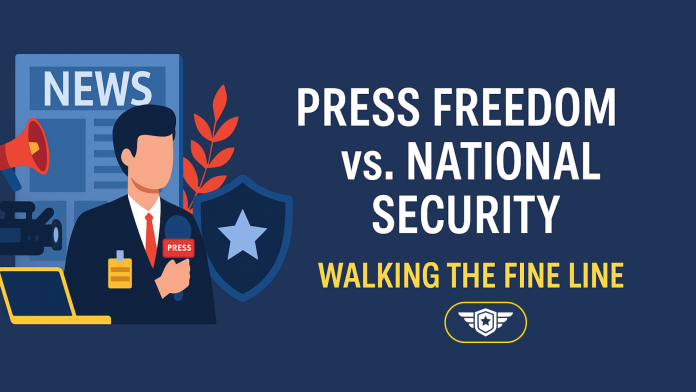📰 Press Freedom vs. National Security: Walking the Fine Line
In a democratic country like India, freedom of the press is a cornerstone of civil liberties. It empowers the media to act as a watchdog, hold the government accountable, and inform citizens about the issues that shape their lives. However, this freedom is not absolute—especially when it intersects with national security concerns.
🔍 The Constitutional Framework
Article 19(1)(a) of the Indian Constitution guarantees freedom of speech and expression, which includes press freedom. However, Article 19(2) allows the state to impose “reasonable restrictions” on this freedom in the interests of:
- The sovereignty and integrity of India,
- Security of the State,
- Friendly relations with foreign states,
- Public order, decency, or morality.
This creates a legal space where national security concerns can override journalistic freedom, but such restrictions must be reasonable and justified.
🎯 Challenges for Journalists
When reporting on issues related to terrorism, military operations, insurgency, or internal conflict, journalists face a complex challenge:
- How to inform the public truthfully…
- …without compromising sensitive intelligence, endangering operations, or provoking unrest?
📚 Case Study: Pathankot Terror Attack (2016)
During the Pathankot Airbase attack, some media outlets broadcasted live updates, unintentionally revealing strategic positions of Indian armed forces. This led to concerns over:
- Real-time information being exploited by terrorists.
- Media acting irresponsibly during ongoing operations.
In response, the Indian government called for media regulation during live terror attacks, and the News Broadcasters Association (NBA) issued advisories to avoid compromising security efforts.
⚖ Legal and Ethical Guidelines
- Avoid Live Tactical Coverage
Broadcasting ongoing operations can endanger lives and aid enemies. - Use Verified Sources Only
Avoid publishing unconfirmed intelligence or leaks that may mislead or cause panic. - Balance Public Right to Know vs. National Safety
Ask: Does this information serve the public interest without risking national security? - Abide by Media Ethics Codes
Follow the Press Council of India’s guidelines and NBA code of ethics when reporting on sensitive matters.
💡 Responsible Journalism in Sensitive Times
A responsible journalist can:
- Expose wrongdoings or systemic issues in defence procurement, border policies, etc.
- Question the government on its preparedness or transparency.
- Still ensure that classified information, troop movements, or critical defence data are not compromised.
Example: Investigative reports on the 2019 Pulwama attack aftermath revealed administrative lapses without leaking sensitive details—showing how accountability can be ensured within limits.
🛡 Conclusion: Reporting with Responsibility
National security and press freedom are not enemies—they are both essential pillars of democracy. The key lies in balanced, ethical journalism that does not become a tool for misinformation or a threat to national interest.
Journalists must strive to be both truthful messengers and conscious citizens, protecting the public’s right to know while honoring the nation’s right to stay safe.









